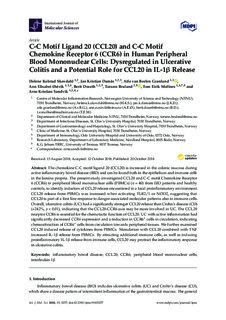C-C Motif Ligand 20 (CCL20) and C-C Motif Chemokine Receptor 6 (CCR6) in Human Peripheral Blood Mononuclear Cells: Dysregulated in Ulcerative Colitis and a Potential Role for CCL20 in IL-1β Release
Skovdahl, Helene Kolstad; Damås, Jan Kristian; Granlund, Atle van Beelen; Østvik, Ann Elisabet; Doseth, Berit; Bruland, Torunn; Mollnes, Tom Eirik; Sandvik, Arne Kristian
Journal article, Peer reviewed
Published version
Permanent lenke
http://hdl.handle.net/11250/2574594Utgivelsesdato
2018Metadata
Vis full innførselSamlinger
Originalversjon
10.3390/ijms19103257Sammendrag
The chemokine C-C motif ligand 20 (CCL20) is increased in the colonic mucosa during active inflammatory bowel disease (IBD) and can be found both in the epithelium and immune cells in the lamina propria. The present study investigated CCL20 and C-C motif Chemokine Receptor 6 (CCR6) in peripheral blood mononuclear cells (PBMCs) (n = 40) from IBD patients and healthy controls, to identify inductors of CCL20 release encountered in a local proinflammatory environment. CCL20 release from PBMCs was increased when activating TLR2/1 or NOD2, suggesting that CCL20 is part of a first line response to danger-associated molecular patterns also in immune cells. Overall, ulcerative colitis (UC) had a significantly stronger CCL20 release than Crohn’s disease (CD) (+242%, p < 0.01), indicating that the CCL20-CCR6 axis may be more involved in UC. The CCL20 receptor CCR6 is essential for the chemotactic function of CCL20. UC with active inflammation had significantly decreased CCR6 expression and a reduction in CCR6+ cells in circulation, indicating chemoattraction of CCR6+ cells from circulation towards peripheral tissues. We further examined CCL20 induced release of cytokines from PBMCs. Stimulation with CCL20 combined with TNF increased IL-1β release from PBMCs. By attracting additional immune cells, as well as inducing proinflammatory IL-1β release from immune cells, CCL20 may protract the inflammatory response in ulcerative colitis.

